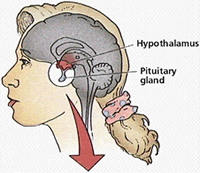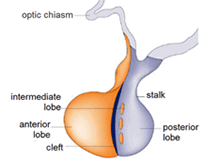|
|
Pituitary Support Remedy
 |
Although the Pituitary is no larger than a pea, it is sometimes referred to as the "master gland." In effect, it has a certain amount of control over all other glands that are responsible for hormone secretion. The gland is attached to the hypothalamus (a part of the brain that affects the pituitary gland) by nerve fibers. The pituitary gland itself consists of three sections: the anterior lobe, the intermediate lobe and the posterior lobe. Each lobe of the pituitary gland produces a specific regulatory hormone messenger or factor. These factors are secreted in response to the outside environment and the internal bodily responses to this environment. These pituitary factors then travel through a rich blood network into the blood stream and eventually reach their specific target gland. They then stimulate the target gland to produce the appropriate type and amount of hormone so the body can respond to the environment correctly.
The release of each of the hormones from the anterior lobe is controlled by a specific substance secreted by nerve cells in the hypothalamus. These substances, called releasing factors, are transmitted by nerve fibers to tiny capillaries in the hypophyseal stalk. They move through blood vessels to the anterior lobe, where each releasing factor is responsible for the release of a specific pituitary hormone.
The tissues in the anterior lobe consist of extensive vascular areas interspersed among glandular cells that secrete at least six different hormones. The first is growth hormone, which stimulates all the tissues in the body to grow by effecting protein formation. The remaining five important hormones influence body functions by stimulating target organs. Adrenocorticotropic hormone (ACTH) controls the secretion of steroid hormones by the adrenal cortex, which affects glucose, protein, and fat metabolism. Thyrotropin controls the rate of thyroxine synthesis by the thyroid gland, which is the principal regulator of body metabolic rate. Prolactin regulates the formation of milk after the birth of an infant. Three separate gonadotropic hormones (follicle-stimulating hormone, luteinizing hormone, and luteotropic hormone) control the growth and reproductive activity of the gonads.
The intermediate lobe produces MSH (melanocyte-stimulating hormone)- to control skin pigmentation.
The two hormones that are produced by the posterior lobe are antidiuretic hormone (ADH or vasopressin), which alters the permeability of the kidney tubules, permitting more water to be retained by the body; and oxytocin, which aids in the release of milk from mammary glands and causes uterine contractions. The only hormone that is synthesized by the intermediate lobe is the melanocyte-stimulating hormone, which controls skin pigmentation.
Fun Facts
- The pituitary gland is about the size of a pea and weighs approximately a half a gram.
- It is also known as the hypophysis or "master gland." The pituitary gland derives the name "master gland" from the critical role it plays in the body.
Health Conditions
- Oversecretion of the pituitary hormone, human growth hormone, can cause gigantism if it occurs before growth of the long bones is complete, or acromegaly if it begins during adulthood. Acromegaly presents with abnormal growth of the hands and feet. Gradual changes within the bones alter the patients face; lowering the brow and prominent lower jaw protrusion. If not treated, this disorder can cause serious illness and even death. In approximately 90% of patients with Acromegaly, a pituitary tumor is responsible for the overproduction of the growth hormone.
- Undersecretion of human growth hormone can lead to dwarfism if experienced during childhood, and decreased endocrine function accompanied by lethargy and loss of sexual capacity in the adult.
- Cushing's Syndrome is caused from continual exposure to high levels of the hormone cortisol. This disorder is rare and most commonly affects adults between 20 to 50 years of age. Symptoms vary, but most often people present with upper body obesity, round, full face and increased fat around the neck. Other symptoms include: severe fatigue, muscle weakness, irritability, anxiety and depression
- Benign tumors, called adenomas, are the most common cause of pituitary disorders. Small "microadenomas" (2- 3 mm or about the size of a pepper corn) are common in the general population (about ten percent of people have them) and are generally considered to be clinically insignificant. However, these lesions can sometimes grow and cause problems. When pituitary adenomas are greater than 1 cm in size (about the size of a grape) they are referred to as "macroadenomas." Macroadenomas are often discovered when they are 1.5 to 2.5 cm because of the "mass effects" that they cause. Pituitary hormone deficiencies may be caused by a growing adenoma as it presses on and damages normal pituitary tissue. The signs and symptoms of these deficiencies can be varied because different combinations of pituitary hormones may be affected.
Suggestions To Strengthen
- Understand that everything doesn't need to be done right away; there is a time for everything..learn to be more calm about the things you think "have to get done."
- Balance the energy between physical exercise and diet rather than mental activity.
- Relax that hard exterior and let the soft side out.
- Learn to take criticism less personally.
|
|
| |
Pituitary Support Remedy
Complete support remedy for Pituitary and related functions
$14.95
|
 Add
To Cart Add
To Cart |
 |
 |
Gallbladder Support Remedy
Complete support remedy for Gallbladder and related functions
$14.95
|
 Add
To Cart Add
To Cart |
 |
 |
Brain Support Remedy
Complete support remedy for Brain and related functions
$14.95
|
 Add
To Cart Add
To Cart |
 |
 |
Large Intestine Support Remedy
Provides support and healing for conditions of the large intestine
$14.95
Read/Write Reviews
|
 Add
To Cart Add
To Cart |
 |
 |
|
|




